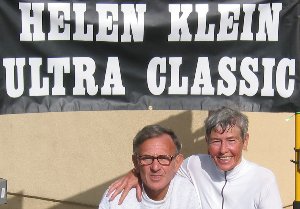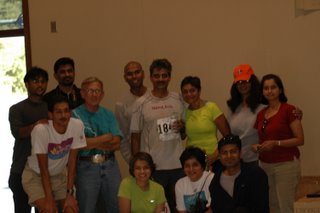
I first met him last year (Nov 2005) at the END of the Helen Klein 50 mile (my first 50 miler) run. The start had been a bit chaotic and I had not had the chance to listen to him talking before the start of the race.
I finished in 10:12 and was lounging around when a friend pointed out Norm and Helen Klein. I walked up to him and thanked him for a wonderful race. The volunteers were top grade as were the aid stations.
Opon hearing from him that he was the RD of the Rio Del Lago 100 mile run, I promised him that I would come back in 2006 and run it. I fulfilled that promise last month.
Anyway back to Norm. There were 7 of us running the race that day, 6 in the 50 miler (Anil, Kiran, Padma, Pradeep, Ganesh and myself) and Anu in her first 50K. Anu had finished at 3:10 p.m. (8:10 for the 50K) and Anil, Pradeep and Ganesh had finished soon after me. All of us were worried about Padma not making the final cutoff. We knew that Kiran, her hubby, was running with her.
That's when I approached Norm again about Padma possibly not making it back by 7:00 pm (final cutoff of 12:00). I was REALLY surprised (and elated) when Norm told me that it did not matter how long she took to get back to the School provided that she had made the last cutoff at at 3:45 p.m. at mile 36.84 (he informed me she had!).
We started celebrating loudly when Padma and Kiran rolled into the School at 7:20 p.m. Norm rounded us up soon after and sang an Indian (Hindi) song for us. That's when he told us about his Indian friend, years and years ago in the 60s, who had taught him the song.
I met him again at the end of my second 50 miler, the American River 50, on April 1, 2006. I ran the last mile with Carol Cuminale and her friend and the three of us trooped into the finish area together. Unfortunately the announcer, Norm Klein, could not read my race number. In order to help him see it, I jumped up and down a few times on my way to the finish. That caused him to remark "Runner #
My decision to do the 100-miler was not yet firm. It firmed up after the Miwok 100K on May 6. I sent in my race entry and that sealed the next 4 months of training as far as I was concerned.
I spoke with Norm in July. The cheque had not been cashed and I wanted confirmation that I was indeed running the 100. He confirmed receiving my cheque and we talked for 10 minutes. I enjoyed that conversation thoroughly.
RDL was a total blast. Norm's briefing the day before was typical Norm. He is an amazingly caring person. His gruff exterior hides a heart of gold. He honored me and my crew by posing for a group picture with us.

I had sent in my HK50 miler entry the week before RDL. I duly received confirmation form Norm. In his own handwriting, he had written across the top "Rajeev, Good job at RDL. See you in November". That moved me no end.
After AR50 I remember reading about Norm Klein. That's when I realized that he was a legend in the Ultra running community. He had changed the face of the Western States 100 in his years of directing that race.
The ultimate compliment was this comment I found in a document about the Himalayan 100-mile Stage Race:
"Mr.Pandey is the Norm Klein of
Excellent organization even in the worlds of the
Cathy Tibbetts, Journalist,
Norm is the benchmark all RDs measure themselves against or are compared with!!